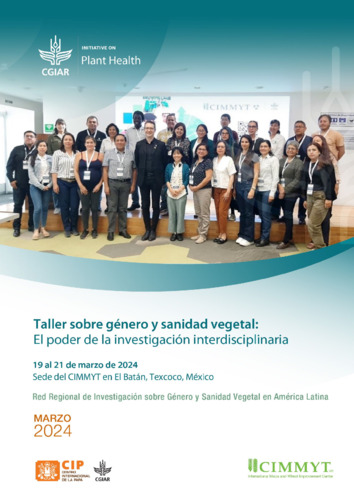The workshop on gender and plant health: The power of interdisciplinary research
Abstract
Gender and Plant Health has often been seen as a very unusual combination, since two disciplines have a different epistemological orientation, use different languages, and have limited experience in working together. Over the past two years, CGIAR Plant Health Initiative has made a progress to bring biophysical and social scientists together to find common language and research agenda. This process has involved cultural shock and confusion, but the collective effort we put has eventually helped us to find inspiration and develop innovative ideas.
We recognize that women farmers in various cultural settings in the global South are treated as the secondary importance in conventional research and extension services. We agree that if the Plant Health Initiative incorporates gender perspectives in research and technology design, interventions will be more effective and technology adoption rate will increase, contributing to overall household food security, climate resilience, and women’s empowerment.
The Plant Health initiative has been conducting interdisciplinary research to address gender in following three themes in Asia, sub-Saharan Africa and Latin America: 1) understanding women’s and men’s direct and indirect roles in plant pest and disease management and gender differences in knowledge on pests and diseases; 2) exploring the bottlenecks of adopting (digital) decision support tools among the different types of farmers, especially women farmers; 3) identifying institutional and structural barriers in extension services to communicate with and deliver information to women farmers.
The next step was to share preliminary findings and develop recommendations and workplans for gender-responsive interventions with more equitable and inclusive scaling approaches. This required in-person discussion with scientists and partners to bring ideas based on their own unique disciplinary and practical experience. To this end, the regional workshop was held with following specific objectives:
To share key findings and insights from interdisciplinary studies on understanding gender and social dimensions of plant health
To develop protocols/strategies for gender-responsive surveys, training and interventions
To identify the most relevant gender-related issues in the Latin American regional cultural context and develop workplan
To have practical learning experience through a field visit to maize growing community.
25 participants (7 men and 18 women) from Peru, Mexico, Ecuador, and Colombia joined the workshop. 92 % of attendees were biophysical scientists such as plant pathologists, entomologists and agronomists including young scientists who are new to this field of interdisciplinary studies.
The workshop took a peer learning approach to ensure active participation and interactions.
In Day 1, participants learned the importance of: 1) incorporating gender differences in farmers’ perceptions, knowledge and interest in crop production and pest and disease management; 2) recognizing women’s indirect roles in crop protection such as seed management (in the case of potato), weeding, harvesting and post-harvesting activities; and 3) diversifying communication means to reach women farmers in strengthening early detection, early warning, and information sharing.
In Day 2, we visited a gender-responsive innovation platform in Cuautempan, Puebla, where Nahua people participate in testing conservation technologies to improve maize production. The platform was led by a female Nahua farmer, Fidelia González Galindo. Her leadership helps CIMMYT scientists to gain trust and communicate with both men and women farmers. We observed how the platform addresses men’s and women’s different priorities, interests, and concerns. We also directly engaged with men and women farmers by using the practical tool to understand gender roles and decision making in maize production and post-harvest activities, which was one of the highlights of the workshop.
Day 3 began with sharing our findings and insight from the field trip, in particular, our experiences of engaging with men and women farmers. We then developed checklists for CGIAR researchers and partners to implement gender-responsive data collection and interventions. The checklists will be published. The workshop closed by reflecting what we learned and how we move forward.
The post-workshop survey result shows that participants were very satisfied with the workshop (100% rated 5 - very satisfied).
I thank all participants for their valuable contribution and CIMMYT for their financial support and logistics with great hospitality and care. This group will continue working together through Gender and Plant Health Regional and Global Research Network, a platform to make a difference in plant health research and interventions for equity, inclusivity, and efficiency.

